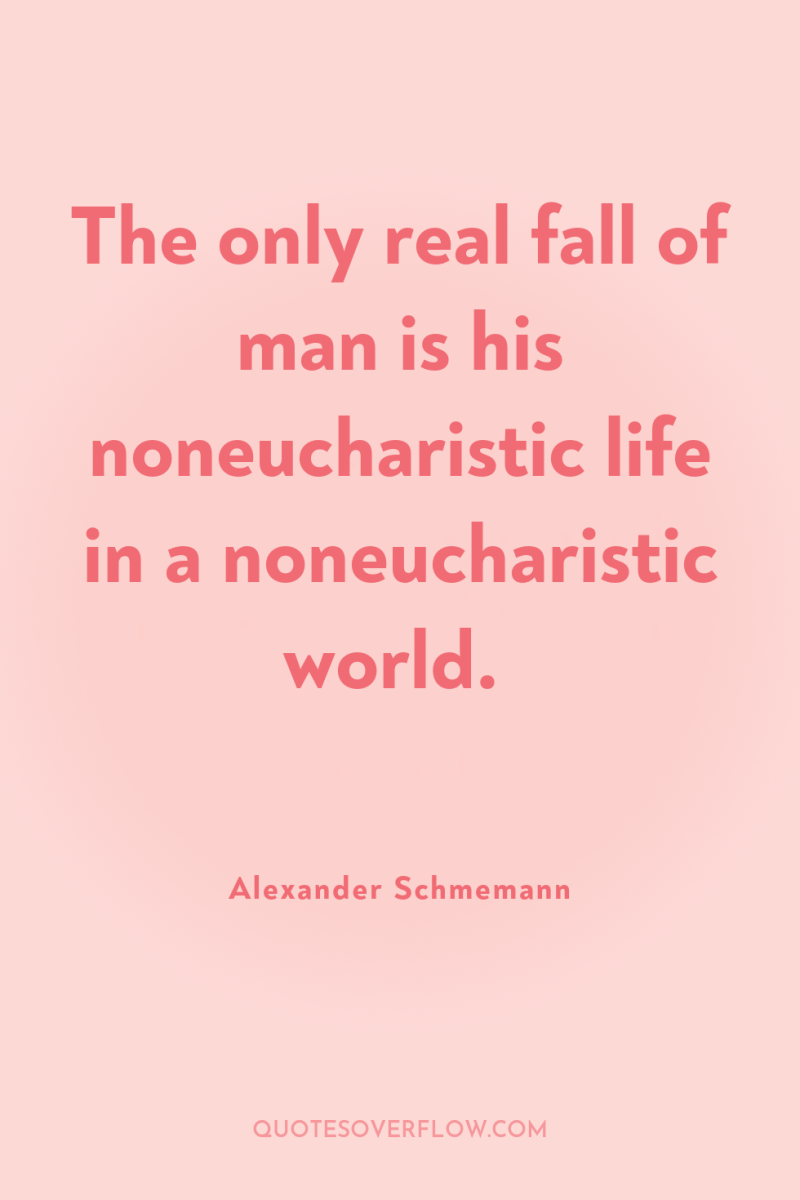1
The liturgy of the Eucharist is best understood as a journey or procession. It is the journey of the Church into the dimension of the Kingdom. We use the word 'dimension' because it seems the best way to indicate the manner of our sacramental entrance into the risen life of Christ. Color transparencies 'come alive' when viewed in three dimensions instead of two. The presence of the added dimension allows us to see much better the actual reality of what has been photographed. In very much the same way, though of course any analogy is condemned to fail, our entrance into the presence of Christ is an entrance into a fourth dimension which allows us to see the ultimate reality of life. It is not an escape from the world, rather it is the arrival at a vantage point from which we can see more deeply into the reality of the world. .Alexander Schmemann

2
The only real fall of man is his noneucharistic life in a noneucharistic world.Alexander Schmemann
3
Whether we "spiritualize" our life or "secularize" our religion, whether we invite men to a spiritual banquet or simply join them at the secular one, the real life of the world, for which we are told God gave his only begotten Son, remains hopelessly beyond our religious grasp.Alexander Schmemann
4
In the radiance of His light the world is not commonplace. The very floor we stand on is a miracle of atoms whizzing about in space. The darkness of sin is clarified, and its burden shouldered. Death is robbed of its finality, trampled down by Christ's death. In a world where everything that seems to be present is immediately past, everything in Christ is able to participate in the eternal present of God.Alexander Schmemann
5
A marriage which does not constantly crucify its own selfishness and self-sufficiency, which does not ‘die to itself’ that it may point beyond itself, is not a Christian marriage. The real sin of marriage today is not adultery or lack of ‘adjustment’ or ‘mental cruelty.’ It is the idolization of the family itself, the refusal to understand marriage as directed toward the Kingdom of God. This is expressed in the sentiment that one would ‘do anything’ for his family, even steal. The family has here ceased to be for the glory of God; it has ceased to be a sacramental entrance into his presence. It is not the lack of respect for the family, it is the idolization of the family that breaks the modern family so easily, making divorce its almost natural shadow. It is the identification of marriage with happiness and the refusal to accept the cross in it. In a Christian marriage, in fact, three are married; and the united loyalty of the two toward the third, who is God, keeps the two in an active unity with each other as well as with God. Yet it is the presence of God which is the death of the marriage as something only ‘natural.’ It is the cross of Christ that brings the self-sufficiency of nature to its end. But ‘by the cross, joy entered the whole world.’ Its presence is thus the real joy of marriage. It is the joyful certitude that the marriage vow, in the perspective of the eternal Kingdom, is not taken ‘until death parts, ’ but until death unites us completely. .Alexander Schmemann
6
Centuries of secularism have failed to transform eating into something strictly utilitarian. Food is still treated with reverence... To eat is still something more than to maintain bodily functions. People may not understand what that 'something more' is, but they nonetheless desire to celebrate it. They are still hungry and thirsty for sacramental life.Alexander Schmemann
7
There has been a rediscovery of the meaning of baptism as entrance and integration into the Church, of "ecclesiological" significance. But ecclesiology, unless it is given its true cosmic perspective ("for the life of the world"), unless it is understood as the christian form of "cosmology, " is always ecclesiolatry, the Church considered as a "being in itself" and not the new relation of god, man and the world.Alexander Schmemann
8
Dost thou renounce Satan, and all his Angels, and all his works, and all his services, and all his pride?" ..The first act of the Christian life is a renunciation, a challenge. No one can be Christ's until he has, first, faced evil, and then become ready to fight it. How far is this spirit from the way in which we often proclaim, or to use a more modern term, "sell" Christianity today! .. How could we then speak of "fight" when the very set-up of our churches must, by definition, convey the idea of softness, comfort, peace? .. One does not see very well where and how "fight" would fit into the weekly bulletin of a suburban parish, among all kings of counseling sessions, bake sales, and "young adult" get-togethers.."Dost thou unite thyself unto Christ? .Alexander Schmemann
9
Once more, the joyful character of the eucharistic gathering must be stressed. For the medieval emphasis on the cross, while not a wrong one, is certainly one-sided. The liturgy is, before everything else, the joyous gathering of those who are to meet the risen Lord and to enter with him into the bridal chamber. And it is this joy of expectation and this expectation of joy that are expressed in singing and ritual, in vestments and in censing, in that whole 'beauty' of the liturgy which has so often been denounced as unnecessary and even sinful. Unnecessary it is indeed, for we are beyond the categories of the 'necessary.' Beauty is never 'necessary, ' 'functional' or 'useful.' And when, expecting someone whom we love, we put a beautiful tablecloth on the table and decorate it with candles and flowers, we do all this not out of necessity, but out of love. And the Church is love, expectation and joy.Alexander Schmemann